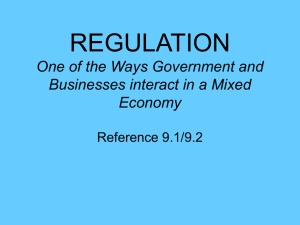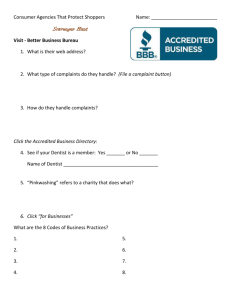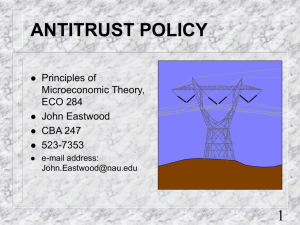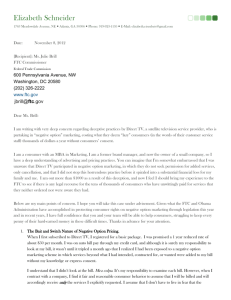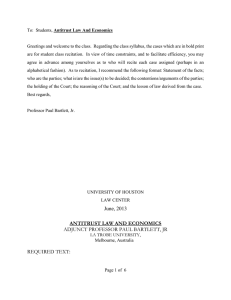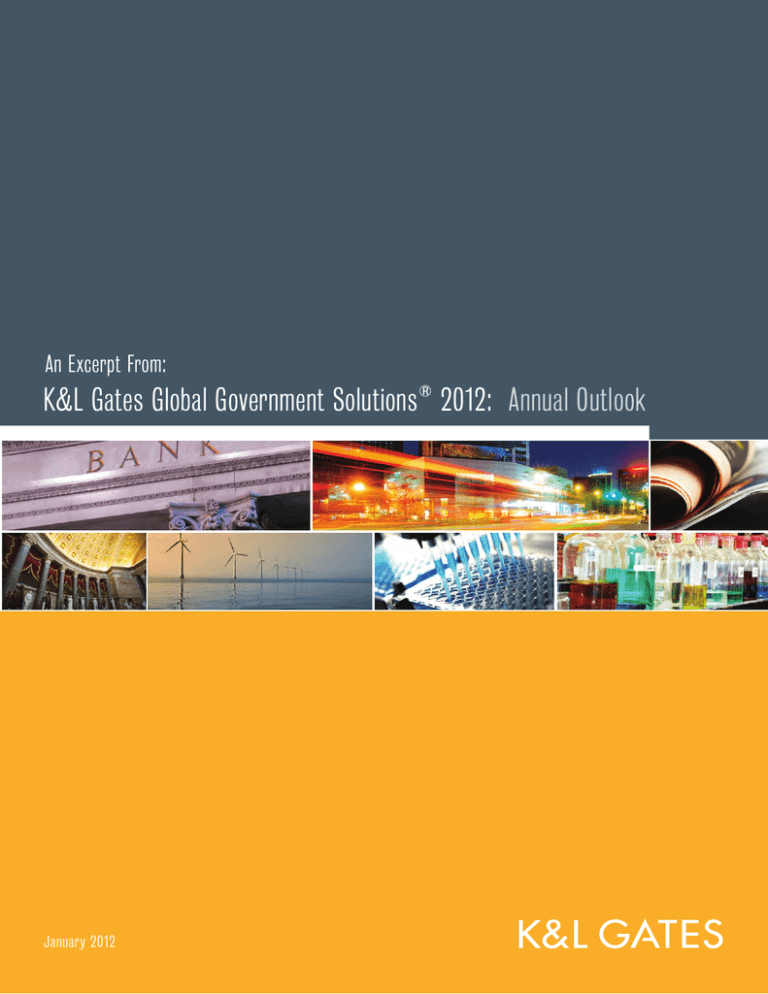
An Excerpt From:
K&L Gates Global Government Solutions ® 2012: Annual Outlook
January 2012
Antitrust and Competition
Recent U.S. Enforcement Activity Underscores the Danger of Firms
with Monopoly Power Refusing to Deal with Non-Exclusive Customers
Moving into 2012, U.S. antitrust enforcement agencies can be expected to
continue their increasing focus on efforts by companies with large market shares
to force customers or suppliers into exclusive dealing arrangements that foreclose
rivals, or potential rivals, from the market. Several recent and pending agency
cases have centered on allegations that a dominant firm has violated Section 2
of the Sherman Act by imposing onerous restrictions on the ability of its vertical
partners to deal with rivals.
These cases are not unprecedented,
but the renewed efforts to challenge this
type of conduct highlight the fact that,
although there is no such thing as conduct
that is “per se” unlawful under Section 2,
which prohibits illegal efforts to preserve
or acquire a monopoly, these situations
come as close as anything to the heart of
the U.S. antitrust enforcement agenda in
terms of unilateral-conduct cases.
Over the years, the enforcement agencies
have pursued all kinds of conduct under
Section 2, from below-cost pricing in
the American Airlines case, to the old
AT&T’s refusals to interconnect with rival
long-distance companies like MCI, to
the myriad of behaviors challenged in
the IBM and Microsoft cases. But in
recent years, it has become clear that
the behavior most likely to draw fire from
the agencies is the refusal to deal with a
customer (or supplier) unless that customer
(or supplier) agrees to stop dealing with
rivals of the monopolist.
Challenges to restrictions on dealing
date back at least to the government’s
successful challenge under Section 2
of the Sherman Act to a monopoly
newspaper’s refusal to accept advertising
from companies that also advertised
on the local radio station [see Lorain
Journal Co. v. United States, 342 U.S.
143 (1951)]. The government’s recent
initiatives can be traced to the Justice
Department’s challenge to a “loyalty”
policy enforced by Dentsply, the dominant
firm in the artificial tooth market [see
United States v. Dentsply Int’l, Inc., 399
F.3d 131, 189-90 (3d Cir. 2005)].
Dentsply had a policy of refusing to sell to
distributors that also dealt with Dentsply’s
competitors. Because Dentsply had such
a large share of the market, the policy
had real bite: distributors needed to stock
28
K&L Gates Global Government Solutions ® 2012 Annual Outlook
Antitrust and Competition
at least some of Dentsply’s teeth, because
they were demanded by dental labs.
In the last two years, the government
has brought several cases fitting into
this mold. In In re Intel Corporation (FTC
December 16, 2009), the U.S. Federal
Trade Commission (FTC) challenged Intel’s
arrangements that required computer
manufacturers not to adopt or purchase
non-Intel CPUs. The FTC alleged that
this conduct raised barriers in a market
already characterized by a number of
legitimate barriers to entry. Similarly, in
In re Transitions Optical, Inc. (FTC April
22, 2010), the FTC challenged the
leading U.S. photochromic lens treatment
developer’s practice of requiring its
manufacturer customers to exclusively use
its lenses. The FTC also took issue with
the company’s agreements with retail
chains and wholesale labs to restrict
their ability to sell competing lenses. The
FTC alleged that such tactics foreclosed
rivals from the relevant markets, harming
competition and consumers.
The FTC’s most recent effort in this
regard, In re Pool Corporation (FTC
November 21, 2011), involved a
challenge to the allegedly exclusionary
tactics of PoolCorp, the largest U.S.
pool product distributor. The FTC’s
complaint alleged that PoolCorp refused
to purchase supplies from manufacturers
that also sold to new distributors
competing with PoolCorp. In a statement
addressing the PoolCorp Complaint, the
FTC Commissioners stated that
“[c]onduct by a monopolist that raises
rivals’ costs can harm competition
by creating an artificial price floor or
deterring investments in quality, service,
and innovation.” The Commissioners
also warned that new rivals are often
the targets of anti-competitive exclusion
because they are most likely to create
competition in the market by competing
aggressively on price and introducing
innovative business strategies, indicating
that the FTC will be keeping a close
eye on market leaders that target new
entrants with exclusionary conduct.
Given the resurgence of government
enforcement in single-firm, exclusionary
conduct scenarios, companies that have
market power should seek the advice of
antitrust counsel if considering entering
into exclusive, or de facto exclusive,
agreements that could foreclose rivals
from customers or sources of supply.
Kenneth L. Glazer (Washington, D.C.)
ken.glazer@klgates.com
Lauren N. Norris (Chicago)
lauren.norris@klgates.com
The Department of Justice’s Antitrust
Division has also come down hard on
this same type of conduct. In United
States v. United Regional Health Care
System (N.D. Tex. February 25, 2011),
the Antitrust Division alleged that United
Regional unlawfully maintained its
monopoly for hospital services in the
Wichita Falls area by offering contracts
with steep discounts to health insurers in
exchange for exclusivity. Since United
Regional—a dominant hospital in
the area—was a “must have” service
provider for insurers selling health
insurance in that market, and since
the penalty for contracting with United
Regional’s rivals was so significant,
the Antitrust Division alleged that this
practice was exclusionary and effectively
prevented insurers from contracting with
United Regional’s competitors.
K&L Gates Global Government Solutions ® 2012 Annual Outlook
29
Anchorage Austin Beijing Berlin Boston Brussels Charleston Charlotte Chicago Dallas Doha Dubai Fort Worth Frankfurt Harrisburg
Hong Kong London Los Angeles Miami Moscow Newark New York Orange County Palo Alto Paris Pittsburgh Portland Raleigh
Research Triangle Park San Diego San Francisco São Paulo Seattle Shanghai Singapore Spokane Taipei Tokyo Warsaw Washington, D.C.
K&L Gates includes lawyers practicing out of 40 offices located in North America, Europe, Asia, South America,
and the Middle East, and represents numerous GLOBAL 500, FORTUNE 100, and FTSE 100 corporations, in
addition to growth and middle market companies, entrepreneurs, capital market participants and public sector
entities. For more information about K&L Gates or its locations and registrations, visit www.klgates.com.
This publication is for informational purposes and does not contain or convey legal advice. The information herein should not be used or relied upon in regard to
any particular facts or circumstances without first consulting a lawyer.
©2012 K&L Gates LLP. All Rights Reserved.


